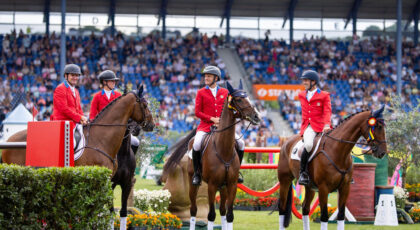Four years ago I was invited to present the daily devotional which I called “Horse Sense for Politicians” drawn from experience working with my Shetland pony that I’ve trained to pull me in a cart.
These past few weeks, as I am mucking out stalls either before or after our sessions here in the House, I found those reflections particularly relevant.
As many of you know, equines are herd animals. Group dynamics and hierarchy are important. There’s always a top mare, and horses are quite content to follow the leader of the pack. However, reconfigure the group in any way, and leadership is up for grabs. Size, tenure, and age don’t matter; taking charge with a few nips and kicks delivers the appropriate gravitas.
During the session, many legislators will be in a leadership position one day and a supporting role the next. I urge us to challenge each other to accomplish even more, and when necessary to step up for issues important to constituents—even if we have to elbow our way in.
Horses have eyes on the sides of their heads and see the world peripherally with 350-degree vision. When driving my pony, I put her in a bridle with blinders to focus her on the work ahead.
Representatives have their own blinders on when dealing with the bottom line or with committee assignments. I encourage us to embrace the periphery and not forget those who live outside this chamber. As we charge ahead, remember those alongside and behind us.
Training a horse requires patience, consistency, taking the long view, positive reinforcement, changing patterns so as not to get stale, getting out of your comfort zone, and reaching for new achievements. Failure is an essential component of learning.
This is familiar to seasoned legislators, since you have toiled on bills for years before passage. As a new member, remind me to, “Stay the course.”
Horse training used to rely mostly on domination; now we seek to learn the animal and understand how it perceives the world.
With tough decisions ahead on balancing expenditures and revenues, let’s remember these line items represent real people struggling with real concerns. Seek authentic input and dialogue, listen intently, and adapt accordingly, since our realities may be quite different from those of the people we seek to serve.
A lot of my time with the pony in winter is drudgery: mucking out stalls, chopping ice in frozen water buckets, cleaning hooves, and exercising her in the unheated drafty barn. But when I sit in the cart and our drive goes well, all the effort is worth it as we glide through space.
I wish all elected officials joy in our daily chores. I hope your efforts come to fruition, and more importantly, that we contribute to a just and civil society where all Vermonters can have safe, healthy, robust, and expressive lives.
About the Author
John R. Killacky is serving in his first term as an elected legislator in the Vermont House of Representatives.


 February 6, 2019
February 6, 2019 
























